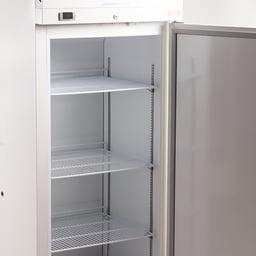
We have spoken about ultralow freezers in previous blogs, so we will be concentrating on the range of -minus 20°C to minus 30°C. We will explore the key features (and exceptions), applications, and benefits of this range of laboratory freezers, highlighting their significance in preserving scientific integrity and advancing research. Thermoline provides a range of frost-free and manual defrost laboratory freezers.
Understanding Laboratory Freezers
Laboratory freezers are refrigeration units specifically engineered to maintain temperatures below freezing. They are can be designed to store a wide range of items, including biological samples, vaccines, enzymes, DNA, and chemicals, at precise and consistently low temperatures. These freezers come in various sizes and configurations to suit the diverse needs of laboratories, research centres, and medical institutions. Models can range in size, configuration, refrigeration type and whether they are able to store dangerous goods.
Key Features of Laboratory Freezers
1. Temperature Control: Laboratory freezers offer accurate temperature control, ensuring samples are stored at the desired temperature to maintain their integrity and viability.
2. Frost-Free Technology: Many modern freezers incorporate frost-free technology, reducing the buildup of ice and frost, which can damage samples and affect cooling efficiency. By having a frost-free (auto defrost) set at minus 30°C, it will keep samples below minus 20°C during the defrost cycle. Some samples need very stable temperatures, and frost-free can’t provide that, so manual defrost laboratory freezers have a place in current use. Most spark-free freezers are manual defrost type freezers as well.
3. Alarm Systems: Freezers are equipped with temperature alarms to alert users in case of temperature fluctuations, power outages, or other emergencies.
4. Energy-Efficient Design: To minimise energy consumption and environmental impact, laboratory freezers are built with energy-efficient components and insulation.
5. Storage Capacity: Laboratory freezers come in a range of storage capacities, from small benchtop units to large upright or chest freezers, catering to the diverse storage requirements of different laboratories.
Applications of Laboratory Freezers
1. Sample Storage: The primary application of laboratory freezers is the long-term storage of biological samples, including tissues, blood, cell cultures, and DNA, preserving their integrity for future research and analysis.
2. Vaccine Storage: Medical facilities and research centres rely on laboratory freezers to store vaccines and other temperature-sensitive pharmaceutical products, ensuring their efficacy and safety.
3. Enzyme and Protein Storage: Laboratory freezers maintain the stability and activity of enzymes and proteins, critical for various biochemical experiments and applications.
4. Chemical Preservation: Researchers store chemicals and reagents in freezers to prevent degradation and ensure consistent results in chemical reactions and analyses.
5. Long-Term Studies: Freezers facilitate long-term studies, enabling researchers to access and analyse samples over extended periods, even years or decades (this is often the ultralow type freezer).
Benefits of Using Laboratory Freezers
1. Sample Integrity: By providing a stable and controlled cold environment, laboratory freezers ensure the integrity and viability of biological samples and other temperature-sensitive materials.
2. Cost Savings: Freezers minimise sample wastage, reducing the need for repeat experiments and preserving valuable research materials.
3. Data Reproducibility: With consistent temperature control, freezers contribute to data reproducibility, a crucial aspect of scientific research and validation.
4. Disaster Preparedness: Freezers with temperature alarms and backup power ensure samples remain safe during power outages or other emergencies.
5. Space Optimisation: Laboratory freezers are available in various sizes, making it possible to choose the right unit that fits the available laboratory space.
Laboratory freezers are indispensable tools that play a vital role in preserving the integrity of scientific research and medical samples. Their accurate temperature control, frost-free technology (when required), and energy-efficient design ensure the reliable storage of biological specimens, vaccines, chemicals, and more. By safeguarding these valuable materials, laboratory freezers empower researchers and medical professionals to advance knowledge, develop innovative treatments, and contribute to the betterment of society. As technology continues to advance, laboratory freezers will undoubtedly remain at the forefront of scientific and medical progress, safeguarding the foundation of research and discovery.
Thermoline’s sales team are happy to provide quotes and answer any questions you may have.






